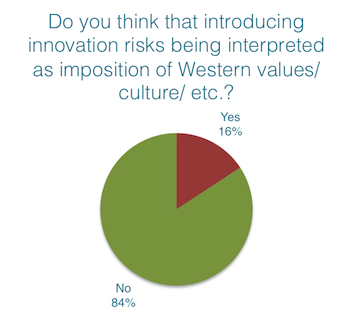In the third of a series of live online events hosted by PHAP leading up to the World Humanitarian Summit Eastern and Southern Africa regional consultation, the focus was put on the theme of “transformation through innovation,” and specifically on how to successfully scale up innovations for humanitarian action, both in the region and globally. The event, which took place on Thursday, 16 October, featured Olivier Delarue, who leads UNHCR Innovation, a multi-year effort seeking to foster and support creative problem-solving, experimentation, and new kinds of partnerships; Helen Altshul, Deputy Chief of Party for the USAID-funded Resilience and Economic Growth in Arid Lands (REGAL) project at Adeso; and Rob Beyer, a consultant active in the planning for the launch of the Indian incubator Villgro Innovation into the Kenyan entrepreneurial ecosystem.
Olivier Delarue started off the discussion by outlining how innovation is being driven inside and outside UNHCR, with their many partners, and throughout affected communities. He explained that a lack of innovation was not the main issue of concern – over the last 60 years, many innovative solutions had been developed, but had not been recognized, fostered, and scaled up. Importantly, new solutions often need to be adopted by communities, which only happens when the solution is developed together with the people supposed to be benefiting from it and using it. Olivier called for a change of attitude when it comes to problem-solving, and called for greater involvement from the private sector to add sustainability to innovative solutions. He pointed out that just “scaling up” an innovation is not actually the end goal; sustainability is required in order to truly promote resilience.
Helen Altshul continued the discussion with a presentation of the REGAL project – an example of a successfully scaled-up innovative approach in the region. The project goal was to reduce hunger and poverty among pastoral communities in Kenya’s arid and semi-arid lands by “doing business differently” through a people-centred, market-orientated, and community-owned approach.
 |
| Participants were asked a number of snap polls throughout the event – both multiple choice and asking for short written input – that helped guide the discussion and gather the inputs of everyone present. This example shows the participants’ views regarding the perceptual risks of focusing on innovation. |
Rob Beyer described how Villgro Innovation has become the largest social enterprise incubator in India, and highlighted some of the challenges and opportunities of launching this model in Kenya. Rob underlined the lack of awareness of existing innovations in the humanitarian sector: “There are so many great innovations taking place, but no one knows about them.” He proposed the formation of a center of innovation for humanitarian action and disaster risk reduction, as a forum to connect innovators for collaborative and synergistic thinking.
In the discussion between speakers and participants following the presentation, a range of issues were brought up, including the existence of communication gaps regarding innovations between humanitarian agencies and affected people, as well as between humanitarian agencies and the private sector, and whether the focus on innovation risked being seen as an imposition of “Western values” in certain contexts.
A recording is available for those who missed the event at phap.org/16oct2014 and it is possible to continue the discussion in the World Humanitarian Summit discussion forums on innovation.